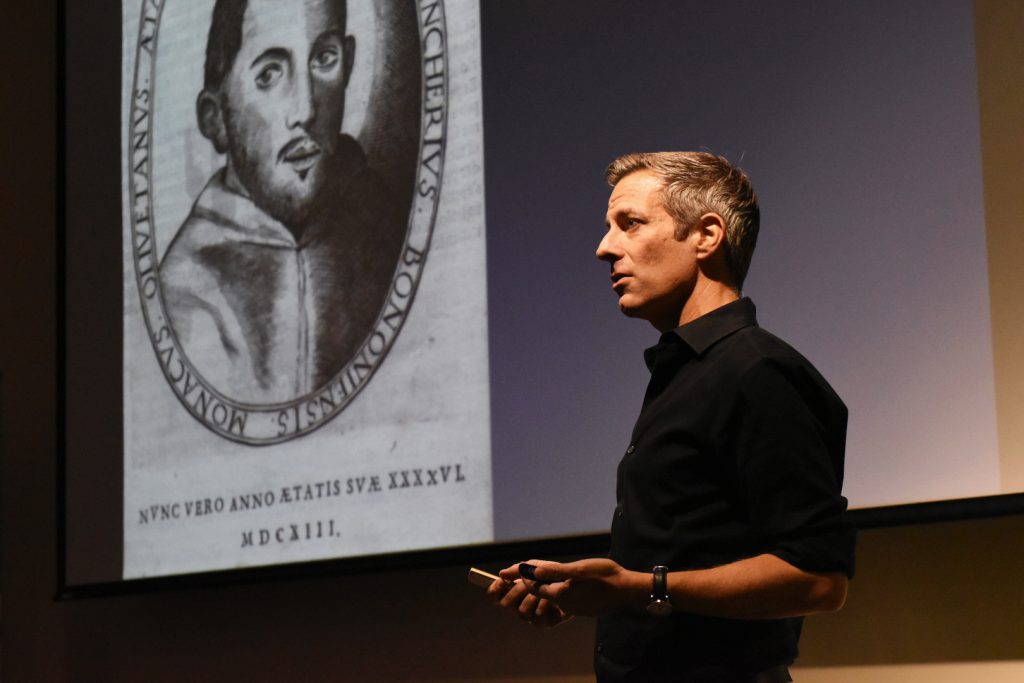Two Binghamton University professors spoke at BU’s second-ever TEDxBinghamtonUniversity Salon about historical class and racial injustices in their respective fields.
The TEDxBinghamtonUniversity Salon event, “Historically Speaking,” took place Tuesday night in the Admissions Center with featured talks by Paul Schleuse and Kent Schull. Salon talks are miniature versions of the larger TEDxBinghamtonUniversity talks in the spring.
Schull, chair of the history department and an associate professor of history, spoke to a room of about 30 people. As a member of the faculty advisory committee for the Institute for Genocide and Mass Atrocity Prevention (I-GMAP), Schull said he views history as a tool to prevent creating another refugee crisis in the future.
“In this course I’m teaching this semester on forced migration in the Middle East, I am bringing in what’s called a preventative lens,” Schull said. “We can’t change the past, but what we can learn from it is to think about how do we prevent these types of actions from happening again in the future.”
Schull discussed the Middle East refugee crisis, which he said was created in part by President Donald Trump and the Turkish government by sending Syrian refugees to a buffer zone between Turkey and Syria. This would displace the Kurds living there.
“The biggest thing is the irony, and really the insidious nature of what we call conflict resolution,” Schull said. “It’s not really about peace, it’s taking the most marginalized and using those as objects to try and achieve some broader domestic and geopolitical goals … This has happened around the world and the idea of forcing a population to move from one area to another goes back deep into history. We just keep trying the same thing over and over again.”
Schleuse, an associate professor of music, spoke about the importance of music and how it can be used as an outlet of disdain for certain groups. He focused on the Renaissance period and the madrigal songs the upper class sang.
“A madrigal is a song that sets a high status, elite, literary poem and is sung usually by a group of four, five, six people,” Schleuse said.
According to Schleuse, the middle class in Renaissance Italy made parodies of the madrigals sung by the aristocrats. These songs were translated to languages of the middle class, thought to be “lesser” languages, including Venetian and Bolognese. High-status songs that were once about love were turned into songs about bodily functions and dysfunctions to poke fun at the upper class.
“I am a musicologist, which means that I study music and history,” Schleuse said. “But it’s not just a question of names and dates and titles. It’s really about how music is used in society, what music means to the people who are writing it and performing it and listening to it.”
Bridget Shanley, a second-year director for TEDxBinghamtonUniversity and a senior majoring in English, said the speakers were chosen by the TEDxBinghamtonUniversity organizers because they had prior knowledge of their work and ability to give a good presentation.
“So actually they’re [TEDxBinghamtonUniversity directors’] professors,” Shanley said. “They knew they had very interesting research, they knew they were great speakers already because they’d taken a class with them.”
This was the first year that TEDxBinghamtonUniversity put on salon events. The first salon took place in September and focused on the environment. There will be another salon event in the spring semester and the main conference in March. According to Shanley, the events aim to educate students on subjects they wouldn’t normally learn about.
“We just wanted students to come out and learn something new,” Shanley said. “These aren’t classes they would normally take because they’re much more compact, and we think they’re a lot more interesting sometimes because they don’t have to do this for a grade, it’s just something that they can learn on their own time and do on campus and not watch on a screen.”
Asim Ayana Kapparova, a sophomore majoring in mechanical engineering, attended the event after receiving an email about it. She said she was interested in attending because she used to participate in TEDx.
“I did TEDx in high school, so I’ve been interested in TEDx talks and just wanted to see what was going on here,” Ayana Kapparova said. “I thought it was cool, I definitely learned something completely new with the first talk, I hadn’t really heard anything about musicology before. I’ve wanted to learn more about the Middle East — I specifically came mostly for the second talk.”
Shanley is hopeful that the new TEDxBinghamtonUniversity salons will continue to grow.
“We’re trying to get more and more people because this is the first year we’re doing salons,” Shanley said. “This is brand-new for us. We’re learning as we’re going.”



